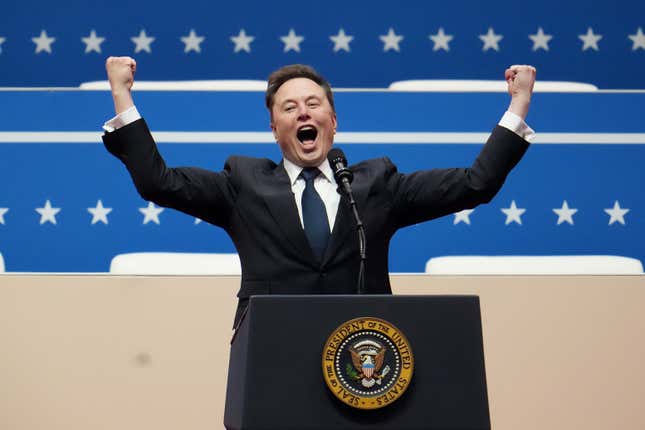
Elon Musk’s Department of Government Efficiency (DOGE) came into existence with the pledge to slash red tape and dismantle the federal bureaucracy. Although it certainly hasn’t been free of controversy, there’s one group of people that have stars in their eyes: defense industry CEOs.
“We think this is a really good thing,” TransDigm (TDG) CEO Kevin Stein said on a recent earnings call, calling DOGE a “great opportunity” to streamline procurement at the Department of Defense (DOD) and Defense Logistics Agency (DLA).
The DOD is a prime target for DOGE, whose leaders and allies in Congress have already singled out the department. The Defense Department has failed seven consecutive audits, and critics say that overregulation has left the Pentagon slow to act and unable to quickly procure goods and services.
The Government Accountability Office in June, as part of its annual survey of 76 leading procurement programs, called the DOD “alarmingly slow” to deliver new and innovative weapon systems. The Stimson Center, a foreign policy think tank, estimates that at least $60 billion in Pentagon “waste and inefficiencies” can be saved by slashing personal and contract workers, canceling or reducing some weapons systems, and other actions.
“We are in a geopolitically very difficult environment where...we’re just not moving fast enough,” Booz Allen Hamilton (BAH) CEO Horacio Rozanski, said on an earnings call. “[T]here’s a real desire in the department both by the incoming team and by the existing professionals there, to accelerate things.
Executives at Serco Group, L3Harris (LHX), Palantir (PLTR), and Northrop Grumman (NOC) said on recent calls that DOGE and President Donald Trump’s administration’s focus on efficiency either aligned with aspects of their business or otherwise had some praise for the initiative. Lockheed Martin’s (LMT) CEO called DOGE an “opportunity” to help streamline the DOD’s acquisition process.
“Disruption, at the end of the day, exposes things that aren’t working,” said Palantir CEO Alex Karp. “There’ll be ups and downs. This is a revolution. Some people can get their heads cut off.”
Musk’s SpaceX, which he founded and leads as its CEO, is itself a major government contractor. His company has received about $3.3 billion in unclassified revenue over the past 12 months, according to USASpending.gov. In 2021, SpaceX won a $1.8 billion deal to build a network of spy satellites for the National Reconnaissance Office.
Although ethics experts have concerns over any role Musk will have overseeing agencies that his companies work with, he appears to be heavily involved in DOGE’s aggressive efforts. Several defense companies have already started meeting with DOGE or related parties.
Boeing (BA) CEO Kelly Ortberg told CNBC last month that he is working with Musk on delivering his company’s replacements for the president’s Air Force One, which are more than $2 billion over budget and years late. Stein said he had met with some DOGE members, although he noted that about 1% of TransDigm’s revenue would be of interest to the group.
General Atomics Aeronautical Systems, which makes the Predator drone, in a January letter, urged Musk to reform the defense acquisition system, Reuters reported. L3Harris CEO Chris Kubasik has outlined his own recommendations, including measures to free up defense firms’ resources and limit contractors’ ability to protest a contract award.
During a Jan. 30 earnings call, Kubasik said he knows “several others” have begun writing letters to DOGE and that he’s received “lots of positive feedback” from some members of Congress. “I think a lot of people read the letter. I’m really just trying to start the dialogue,” he added.
Other defense companies have been optimistic about Musk’s promise to slash regulations but are a little less full-throated in their support.
General Dynamics (GD) CEO Phebe Novakovic said on a call that his company would “embrace” any actions that improve the efficiency and cost structure of organizations. Matthew Desch, who leads satellite communications firm Iridium Communications (IRDM), which holds a contract with the DOD and U.S. Space Force, said DOGE was “probably a positive.”
“I’d be glad to have less regulations,” Desch said on an earnings call. “Personally, I think people have been [trying] for a long time. I’m a little skeptical how well that will work.”